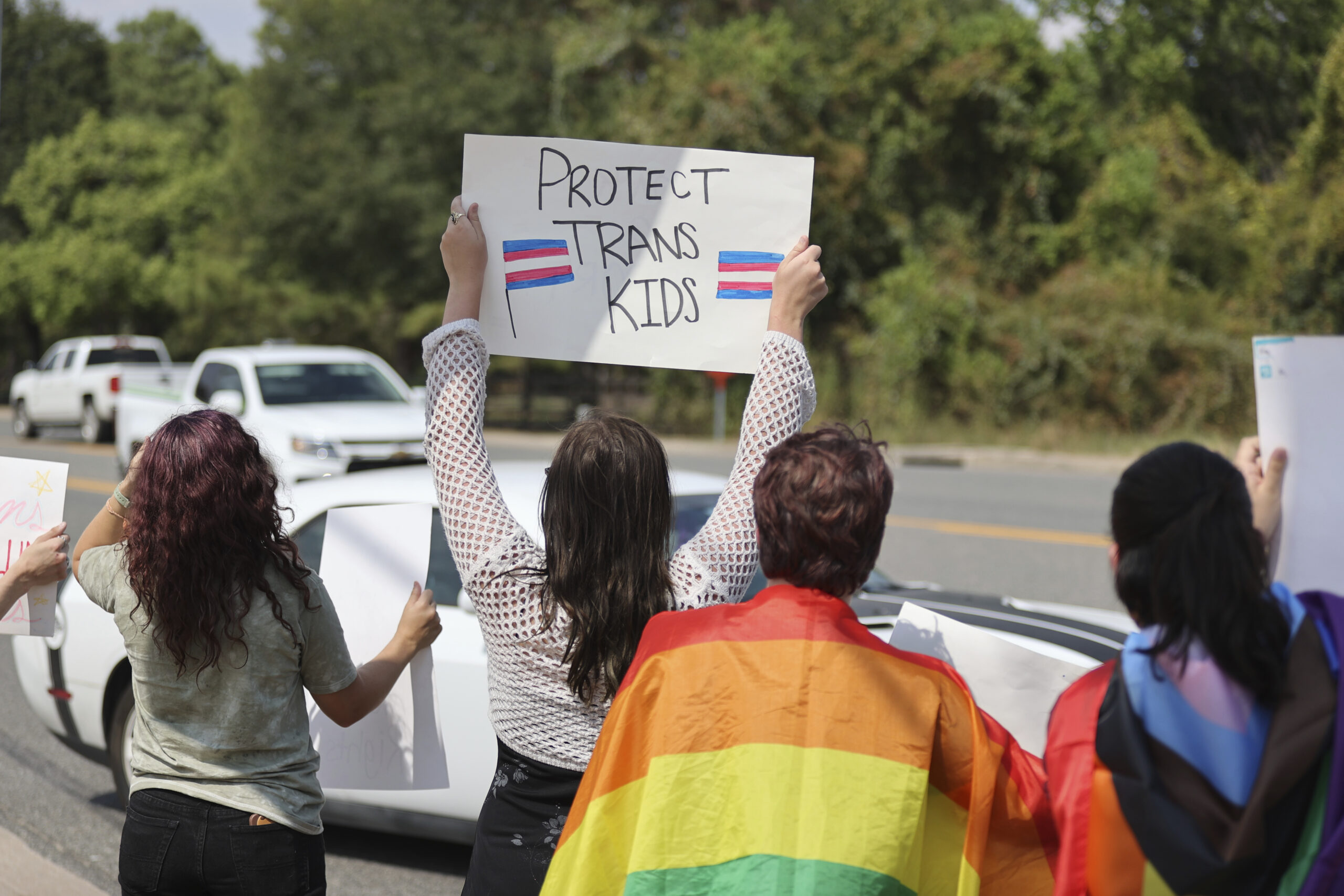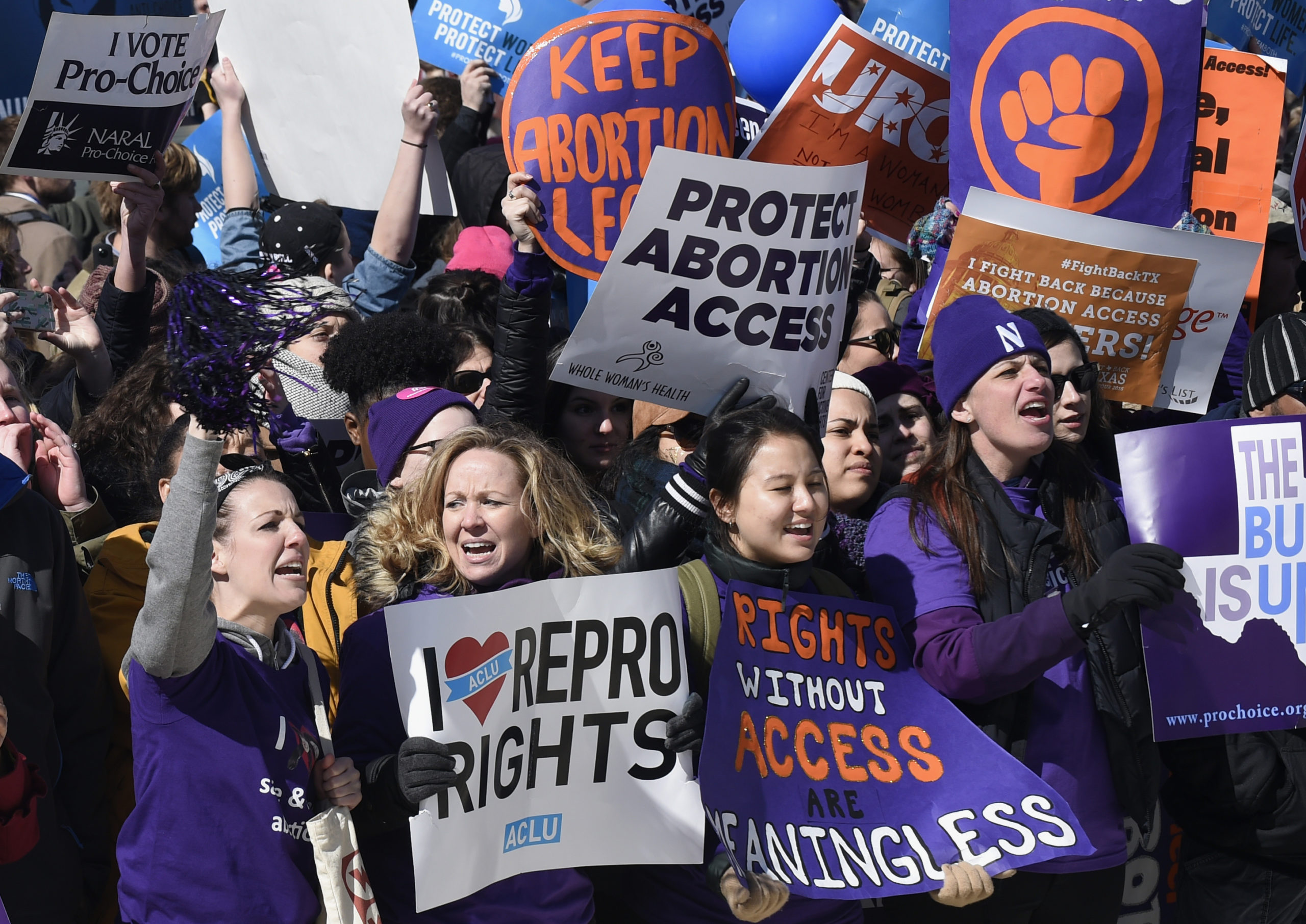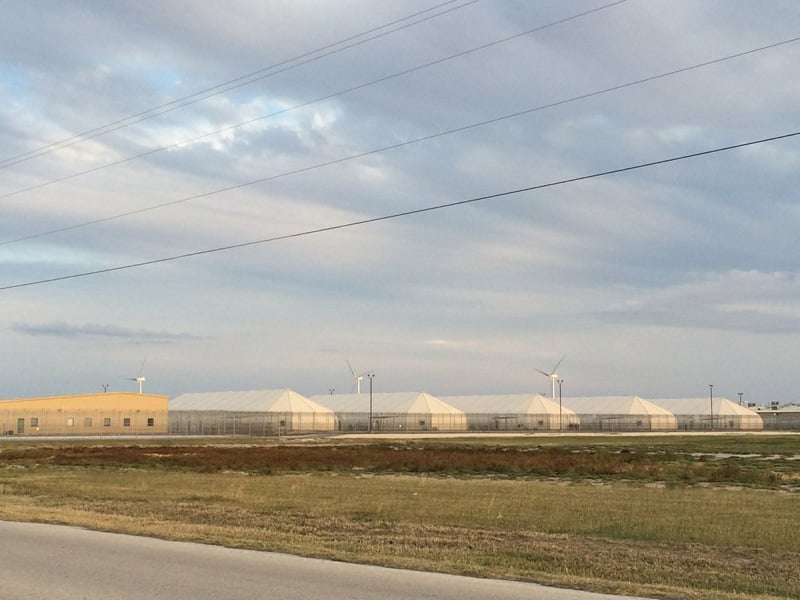
Immigrants in Federal Prisons ‘Subjected to Shocking Abuse and Mistreatment’
With attention focused on other aspects of immigration reform, the federal government has quietly gone on a massive immigrant prison building spree. Since 1999, the Bureau of Prisons has contracted for the operation of 13 for-profit private prisons located mostly in isolated towns far from the prying eyes of activists, prisoner’s families or attorneys. Five are located in Texas. Run by three private companies, these 13 “criminal alien requirement” prisons, as the BOP calls them, house one of America’s fastest-growing prison populations: immigrants in federal custody, many convicted for the crime of illegally crossing the border. The 13 facilities collectively house more than 25,000 immigrant prisoners at a cost to U.S. taxpayers estimated at $1 billion a year.
The BOP typically operates its own prisons, and they have a reputation for being well run and relatively free of scandal. In contrast, the private immigrant prisons, which are filled mostly with low-security inmates, have been rocked by riots and allegations of woefully inadequate medical care. These private prisons exist in legal shadows, unanswerable to many BOP policies and protected by laws that exempt them from open-records requirements. In a multiyear ACLU investigation, the organization found that the BOP shields contractors from disclosing information, claiming “trade secrets” in response to public information requests. The prisoners—non-citizens far from home with little social capital—have few means to speak out.
Such private prisons constitute a dark and little-scrutinized corner of the nation’s vast incarceration apparatus—and perhaps, in the light, its ugliest, according to the ACLU investigation.
In a report, released today, on the five Texas prisons, “Warehoused and Forgotten: Immigrants Trapped in Our Shadow Private-Prison System,” the ACLU claims that the BOP policies discriminate against non-citizen inmates and that prisoners are “subjected to shocking abuse and mistreatment.”
Between 2009 and 2014, the ACLU visited all five Texas prisons, interviewed hundreds of prisoners and their families and reviewed contracts, medical records and other documents held by the Bureau of Prisons. The report describes BOP policies that incentivize overcrowding, indiscriminate use of solitary confinement, and extreme cost-cutting measures that have led to both the death of prisoners and an unusually high number of riots among low-security inmates. The report claims that immigrant prisoners in these facilities have far less access to educational programming and rehabilitation services than their citizen counterparts, raising questions about America’s unequal treatment of non-citizen inmates.
But the Bureau of Prisons told the Observer that the immigrant prisons are an “effective means” to alleviate overcrowding in BOP’s low- and medium-security prisons housing U.S. citizens.
“It is our policy to contract out bed space for non-U.S. citizen inmates in order to make space available for U.S citizen inmates in BOP facilities so they can receive required programming,” wrote spokesman Chris Burke in an email to the Observer.
“The majority of these inmates are sentenced criminal aliens who will be deported upon completion of their sentence. Use of private facilities for this population allows staff in BOP institutions to focus on pre-release preparation for U.S. citizens returning to their communities upon release.”
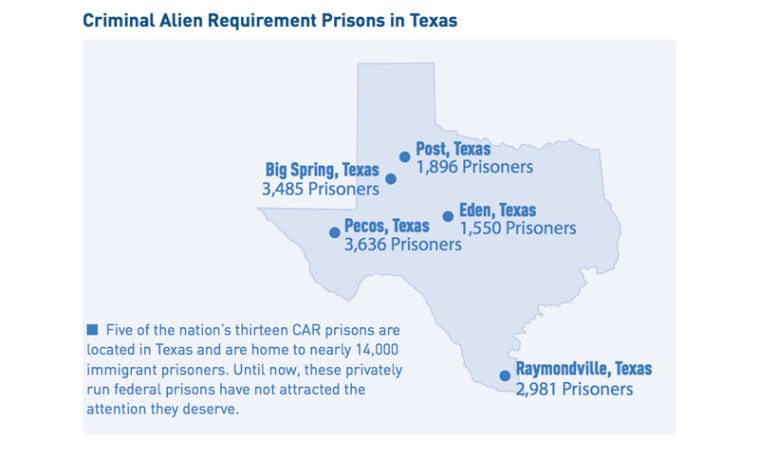
In 2006, the Bush administration unveiled its latest showpiece in a growing network of for-profit detention centers housing undocumented immigrants: the Willacy County Processing Center. As part of a larger border crackdown, Immigration and Customs Enforcement (ICE) had suspended its policy of “catching and releasing” undocumented immigrants. Instead, such immigrants would be locked up in civil detention centers while their cases were processed.
Willacy, located in Raymondville, an impoverished and remote South Texas town about 40 miles from the border, had gone up in a hurry, the result of a $65 million no-bid contract tainted by charges of corruption among county officials. Run by Utah-based Management & Training Corp., the 2,000-bed detention center came to be known as “Ritmo” (a play on Gitmo, the nickname for Guantanamo Bay). Others called it “Tent City” for the jail’s unusual architecture: 10 “tents” consisting of a Kevlar-like material stretched over steel frames. Each tent houses 200 men in bunk beds spaced three feet apart. Before long, reports of awful conditions inside began leaking out: beatings by guards, hundreds of sexual assault allegations, prisoners being denied silverware, maggots in the food, a dangerous lack of medical care. Detainees described their situation as hopeless.
The Willacy County Processing Center became a symbol of a cruel and reckless immigration policy. In 2011, the Obama administration, as part of a pledge to create a “truly civil detention system,” announced that it would remove all detainees from Willacy. But the tents weren’t empty for long. The Bureau of Prisons contracted with Management & Training Corp. to house so-called criminal aliens—some of them undocumented immigrants and some legal residents—convicted in federal court mostly of immigration crimes. The 10-year contract is worth up to $532 million. Inmate advocates said virtually nothing about the facility changed, except which federal agency was nominally in charge and the facility’s name—it’s now the Willacy County Correctional Center.
The ACLU report depicts Willacy as a human pressure-cooker, where inmates have rioted in reaction to overcrowding, squalid conditions and a lack of anything to occupy their time. Inmates described overflowing toilets, insect-infested facilities and tiny recreation yards that have to be shared by 400 prisoners. The few prison jobs available pay between 11 and 17 cents an hour. “They don’t have a job for us,” said Sergio*, a 26-year-old Honduran man who came to the U.S. with his parents when he was 8. “They don’t have any education. They just don’t have any space for all of us. Sometimes it makes me go crazy.”
Things are much worse for those unlucky enough to land in solitary confinement, also known as the SHU (“special housing unit”). According to ACLU interviews with prisoners, about 300 inmates—or 10 percent of Willacy’s population—are locked up in the SHU at any given time. Since April 2013, according to the report, prison administrators have sent new arrivals straight to the SHU because there’s no space available in the general population dorms—a practice the ACLU calls “pointlessly cruel” and “inconsistent” with BOP policies. In solitary confinement prisoners spend almost every hour of the day locked up in tiny cells, with very little outside contact. Prisoners in solitary are forced to spend 22 to 24 hours per day inside a cell, and some prisoners at Eden said they were only offered showers at 1 a.m and recreation at 5 a.m., and as result some chose to never leave their cells. Phone calls to family and friends are limited. According to the ACLU, “the extreme isolation drives men to the verge of psychosis.”
The ACLU documented excessive use of solitary confinement at all five Texas immigrant prisons: Willacy, Eden Detention Center near San Angelo, Reeves County Detention Center in West Texas, Giles W. Dalby Correctional Facility in Post and Big Spring Correctional Center. The report suggests that the prisons use solitary confinement to punish inmates for minor infractions, for complaining about conditions and simply to relieve overcrowding. When inmates began planning a strike to protest conditions at Reeves in 2013—following massive riots in 2008 and 2009 after an epileptic inmate died in the SHU—prison staff tear-gassed inmates, shot them with rubber bullets, locked down the facility and crammed groups of four into two-person solitary cells for two days.
The overuse of solitary confinement can be traced to BOP’s contracts with the prison companies, the ACLU claims. Each contract requires that the prison use 10 percent of its bed space as isolation cells—almost double the rate in BOP-run facilities. One bidder for the Willacy contract asked if the 10 percent quota could be waived “[d]ue to the low security nature of the intended population,” but BOP pressed forward with the requirement.
Chris Burke, a BOP spokesperson, told the Observer in an email that the “requirement is intended to ensure contractors have sufficient bed space to safely manage their inmate populations.”
In September, the BOP asked its prison contractors for recommendations on how to reduce the number of SHU beds from the current 10 percent to 5 percent. “We are still in the process of reviewing the recommendations,” Burke wrote.
Overcrowding is also a result of BOP policies that financially reward prison companies for stuffing their prisons to the breaking point, according to the report. All the Texas contracts require that the prisons maintain at least 90 percent occupancy, and provide extra payments for additional inmates up to 115 percent of capacity. “The companies actually make more money by admitting more prisoners from BOP than their facilities were designed to hold,” the report states.
But the BOP says the ACLU misunderstands how the occupancy requirements work. The 90 percent requirement “simply guarantees that the contractor will receive a minimum payment, regardless of population numbers in their facility,” Burke wrote in an email. And the 115 percent figure “does NOT mean that the facility is 15% overcrowded”—it is equal to a cap on the total number of inmates specified in the contract.
“There is no overcrowding in the BOP’s privately-operated secure adult correctional facilities,” Burke wrote.
Finally, he said that in “most most of these facilities the SHU beds are not part of the maximum contract amount of 115%, so there is no financial incentive to keep these beds filled unnecessarily.”
In reviewing the Texas prisons’ medical records, the ACLU found that immigrants at all five facilities are routinely denied adequate medical care, resulting in deaths and life-threatening complications. At Reeves, prisoners with physical and mental illnesses were placed in solitary confinement because the prison didn’t have an infirmary. According to the report, a man with bipolar disorder committed suicide in solitary after prison staff refused to give him psychotropic medication, putting him in extreme isolation instead. Four months later, Jesus Manuel Galindo died in the SHU after suffering a seizure. Prison staff had known Galindo was epileptic, and had placed him in solitary confinement when he was released from the hospital following a seizure.
During the month that he was in the SHU, the ACLU says, Galindo suffered two other seizures before the one that resulted in his death. “I get sick here by being locked up all by myself,” Galindo wrote in a letter to his mother the day before he died. “They don’t even know and I am all bruised up. … [T]he medical care in here is no good and I’m scared.”
Galindo repeatedly requested that his medication be adjusted, and asked prison staff to remove him from solitary confinement so he wouldn’t be alone if he had another seizure, the report says. When prisoners found out he died, they rioted, setting part of the prison on fire. Despite a second riot during which inmates took two prison employees hostage and set a fire that caused $20 million in damage, prisoners report that conditions remain the same, and that they continue to be denied medical attention. According to the ACLU report, Reeves had only one physician’s assistant and until recently only one doctor to serve a population of more than 3,600 inmates.
In 2010, the contract with GEO Group, a major prison company that runs Reeves, came up for renewal. A BOP official compiled a list of pros and cons, which the ACLU obtained through an open records request. The list contains more than three times as many cons as pros. These include “lack of healthcare has greatly impacted inmate health and well being” and “contractor shows little sign of improvement.” It also mentions that the BOP “spends a significant amount of money” doing GEO Group’s quality control and that GEO is “unable to successfully achieve their own plans of action to correct deficient areas.” The list cites 14 repeat deficiencies, 161 deficiencies, and 57 notices of concern in a 46-month period. In the end, the BOP renewed the contract.
The other two corporations the BOP pays to run its immigrant prisons, Corrections Corporation of America and Management & Training Corp., also fail to provide medical care to immigrant prisoners, according to the ACLU investigation. Inmates at all Texas facilities report a lack of treatment for chronic conditions such as diabetes and kidney disease, and for injuries including varicose ulcers and hernias. Many inmates have to wait months before they can see a doctor—if they see one at all—and have trouble filling prescriptions, including for antibiotics, or are prescribed Tylenol and ibuprofen for a spectrum of serious health problems.
Ian*, a Guatemalan immigrant imprisoned at Dalby, was prescribed laxatives when he complained of intense abdominal pain. His condition worsened, and when he was finally sent to a hospital in Lubbock, his appendix had ruptured and contamination had spread to his intestines. Doctors had to remove part of his lower intestine, and he was then sent to a Brownsville hospital to receive a 20-day intensive antibiotic treatment.
At Eden Detention Center, Santiago* was diagnosed with Hepatitis C, but doctors there didn’t tell him he had contracted the virus. Four months after he was transferred to Willacy, “Santiago became so weak and confused that fellow inmates had to help him stumble out of his cell to eat,” according to the report. “To see a doctor, he squeezed into a cell with 25 other ailing inmates and waited eight hours. Staffers denied his pleas for blood work. Weeks later, a visiting doctor told him why he was sick.”
Nearly two years after he finally found out he has Hepatitis C—which can lead to cirrhosis and liver cancer if left untreated—Santiago has yet to receive any treatment. His mother, Beatrice*, lives more than 500 miles away from Willacy in McCamey, Texas, and has no idea her son is sick. Beatrice is an American citizen, born in the United States, and says that Santiago was born in Presidio, Texas. Beatrice has been on her own, and responsible for her two younger siblings, since the age of 10. When she was 17 she delivered Santiago in the small house an old man let her live in after her father died, she says, and it wasn’t until her son became an adolescent and tried to get an ID that she learned she was supposed to have obtained a birth certificate for him. His three younger siblings were all born in hospitals, so they are all American citizens, as are Santiago’s two children.
Santiago was not able to prove he had been born in Texas, his mother says, but did secure a U.S. visa and driver’s license and worked as a truck driver for many years. He was later deported for drug charges, and it wasn’t until he was sent to Mexico that he learned Spanish. When he attempted to return to the U.S. years later, he was arrested for reentry.
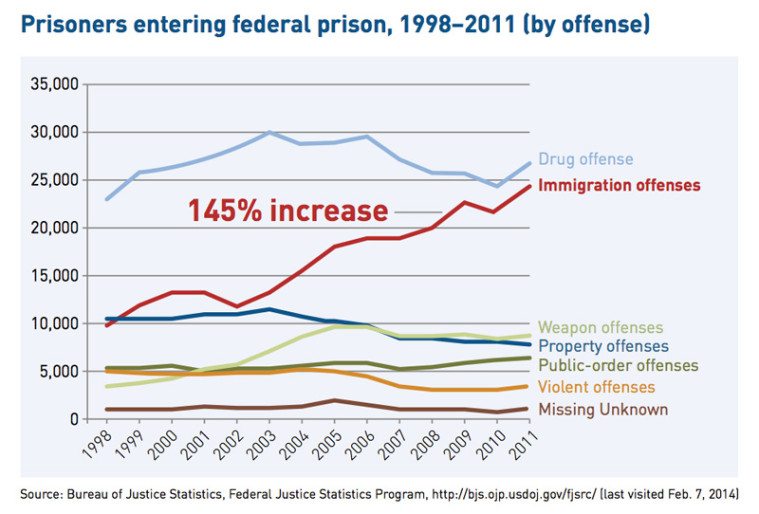
A decade ago, Santiago probably wouldn’t have been thrown in prison for re-entering the country. Before the Bush administration established Operation Streamline in 2005, those caught attempting to enter the country illegally were simply deported or faced hearings in civil courts. Last year, 97,384 people were prosecuted for immigration crimes in the U.S., a 367 percent increase from 2003, according to Syracuse University’s TRAC Immigration project. Nationwide, more than half of all federal criminal prosecutions last year were for illegal entry or reentry into the United States. More people are sent to federal prison for immigration offenses than for violent crime, weapons, and property offenses combined.
This criminalization of immigration has set off a lucrative boom in private prisons.
Private prison companies insist they do not try to influence immigration law and enforcement, but in 2012 an Associated Press analysis found that the three biggest private prison companies—Corrections Corporation of America, GEO Group and Management & Training Corp.—had spent $45 million to lobby state and federal governments over the past decade. The three companies brought in almost $4 billion in revenue in 2012 alone, according to the ACLU report.
The BOP plans to expand its contracted immigrant prison portfolio, and recently posted a solicitation for two more prisons that together can house up 4,000 “at the 115% [capacity] level.”
*In its report, the ACLU changed the names of many inmates and their family members to protect their identities.
